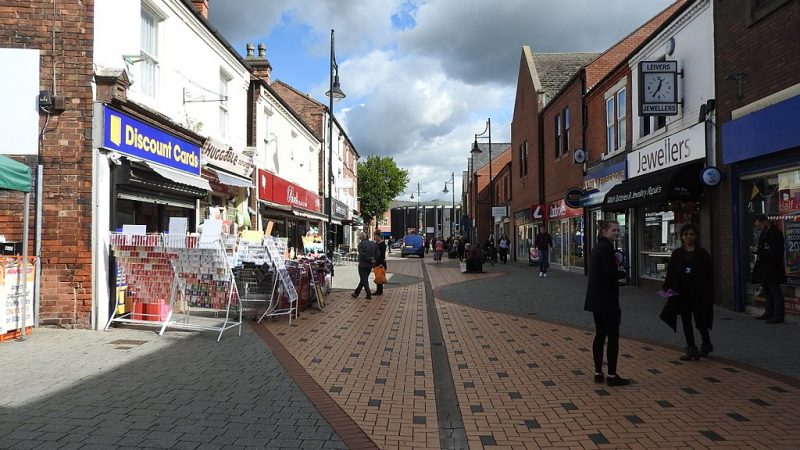We make them better than they were before too.

Prem Sikka is an Emeritus Professor of Accounting and a Labour member of the House of Lords
Under the onslaught of online shopping and related shop closures, town centres are facing massive problems. The impact of Covid has accelerated that trend.
In 2020, some 180,000 retail jobs were lost in the UK. That’s a huge number. It’s the population of Aberdeen and enough people to fill Wembley Stadium twice.
With more people working from home and the demise of Arcadia and Debenhams, more job losses are expected. A KPMG study estimated 400,000 retail jobs are expected to disappear across England.
Town centre are more than shops. They are public spaces where people meet. Empty spaces damage the local economy, encourage crime and make towns less appealing for jobs, residence and investment.
The UK government has provided some financial support to businesses affected by the pandemic, but has presented no plans for rejuvenating town centres.
At the height of the 2007-08 banking crash, the government provided £1.2tn of financial support to bailout banks. It has also used £0.9tn of quantitative easing to prop up corporate bonds and securities market. However, it has not shown the same enthusiasm for rescuing town centres.
There is no single golden-bullet for rejuvenating town centres. Action is needed on many fronts and here are a few suggestions:
- Local authorities need to be empowered to purchase empty shops and shopping malls and remodel them into art centres, museums, leisure and other public spaces. The finance can be provided by the central government, loans from banks and pensions funds, local authority bonds issued directly to people and through a programme of quantitative easing.
- Most of the shops are owned by property companies who charge exorbitant rents. Local council ownership would provide competition for property companies and curb their enthusiasm for rent increases by prioritising community interests rather than short-term shareholder interests. The lower rents would help to attract independent shops and provide variety in town centres.
- The government’s “permitted development” policies have side-lined local councils. Developers can convert empty offices into residential accommodation without planning permission. The resulting developments are often of poor quality. In a form of social cleansing, richer councils are dumping people from their housing list to poorer areas and exacerbating the social problems. The character of many town centres is being permanently changed and not for the better. The recipient councils are unable to plan effectively for jobs, education, transport, healthcare, businesses or anything else. The government needs to give powers to local authorities to reshape town centres.
- Internet companies such as Amazon operate of out of town warehouses and pay lower business rates. Unsurprisingly, many retailers are unhappy about business rates. However, the issues cannot be addressed without a significant change in central government policies. A new funding settlement between local council and central government is needed.
- Charities and community amateur sports clubs can apply for charitable rate relief of up to 80% and pay lower business rates. Such a regime could be extended to social enterprises and not-for-profit organisations and provide diversity in town centres.
- To increase footfall in town-centres, the rate of VAT for sales from brick-and-mortar shops could be lower than for internet sales.
- Good purchasing power in the hand of the masses is an essential condition for rejuvenation of town centres. This requires change in government policies. Austerity policies and erosion of the power of labour have reduced the spending power of the people. Due to anti-trade union legislation and loss of bargaining power, workers’ share of GDP has shrunk from 65.1% in 1976 to 49.4% by September 2020. The government needs to change its policies and increase the spending power of the masses.
- At the end of November 2020, the UK household debt is estimated to £1.7 tn, the highest ever. Such levels of debt inevitably constrain people’s purchasing power and that is translated into fewer visits to shops. Discretionary expenditure on visits to cafes, restaurants, cinemas and theatres are often the major casualty. The government needs to boost the minimum wage and redistribute income and wealth.
- The UK has more senior citizens than ever before but they command low purchasing power even though their expenditure on everyday things is likely to have a greater multiplier effect. The retirees typically live on state pension and benefits supplemented by private pension and personal savings. The erosion of wages has reduced people’s capacity to save and for many the state pension is a significant means of income. Upon retirement, a typical British worker receives a state pension and other benefits worth around 29% of what they had previously been earning. That compares with an average of 63% in other OECD countries, and more than 80% in Italy and the Netherlands. The purchasing power of senior citizens needs to be boosted.
- Major online retailers (e.g. Amazon, eBay) are able to create complex corporate structures to avoid corporate taxes and thus have advantageous cash flows compared to the brick-and-mortar traditional retailers. The government needs to tackle this.
The above is not a comprehensive list of policies needed to rejuvenate town centres, but will hopefully generate a debate about how to rebuild communities. Failure to act will further destroy town centres and communities.
Left Foot Forward doesn't have the backing of big business or billionaires. We rely on the kind and generous support of ordinary people like you.
You can support hard-hitting journalism that holds the right to account, provides a forum for debate among progressives, and covers the stories the rest of the media ignore. Donate today.



